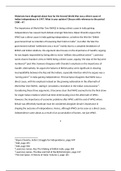Historians have disagreed about how far the Second World War was a direct cause of
Indian independence in 1947. What is your opinion? Discuss with reference to the period
1900 ‐ 47. 47.
The importance of World War Two (WW2) in being a direct cause in India gaining
independence has caused much debate amongst historians. Bipan Chandra argues that
WW2 was a direct cause in India gaining independence, as before the War the ‘British
government had no intention of loosening their hold on India’ 1, but after the War the
government realised ‘settlement was a must’2 mainly due to a complete breakdown of
British and Indian relations. His argument also focuses on the importance of Gandhi, arguing
he was largely responsible by being able to move ‘millions into political action’ 3. Lawrence
James shares Chandra’s view on WW2 being a direct cause, arguing ‘the days of the Raj were
numbered’4 post War, however disagrees with Chandra’s emphasis on the importance of
Gandhi. Alternatively, he argues the failures of British policy were significant in showing
incompatibility between the Raj and the Indians, especially Amritsar which he argues was a
‘turning point’5 in India gaining independence. Percival Spear disagrees that WW2 was a
direct cause, with his emphasis instead on the growing nationalism in the aftermath of
World War One (WW1), stating it ‘provoked a revolution in the Indian consciousness’6.
Considering these three arguments, it becomes clear that WW2 seemed to be the final straw
for Anglo-Indian relations which had been deteriorating since the aftermath of WW1.
However, the importance of economic problems after WW1 until the end of WW2 where
Britain was effectively bankrupt must be considered alongside Jinnah’s importance in
shaping the outcome of independence. Hence, although WW2 can be seen as a direct cause,
independence came about as a result of an accumulation of factors, not just WW2.
1
Bipan Chandra, India’s Struggle for Independence, page 449
2
Ibid, page 491
3
Ibid, page 506
4
Lawrence James, Raj: The Making of British India, page 585
5
Lawrence James, The Rise and Fall of the British Empire, page 417
6
Percival Spear, A History of India: Volume 2, page 181





